Marnie McBean's Blog, page 6
May 1, 2016
Were you ���pulling��� for me then? Would you do it again?
Posted in What I'm thinking (Thoughts and opinions)
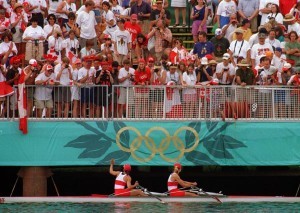
Canada’s Marnie McBean (L) and Kathleen Heddle, gold medal winners greet fans at the 1996 Atlanta Summer Olympic Games. (CP PHOTO/COA/Mike Ridewood)
Many of the blog entries I���ve posted here are intended to share what I���ve learned, to help others when I can. In this post, I���m asking for your help.
20 years ago this July, I was part of something special.
At the 1996 Summer Olympics in Atlanta, I was on a rowing team that won 6 Olympic medals; Canada set the rowing world on fire! When my rowing partner, Kathleen Heddle and I won our 3rd gold medal ��� and a bronze the next day ��� we set a standard that has yet to be met by any Canadian Summer Olympian. I was so fortunate to be part of such an incredible era in Canadian Rowing and I want to do something to recognize this 20th anniversary: I want to do something that gives back.
When the opportunity to ride in the 200km Ride to Conquer Cancer came along I knew that this was my opportunity. Many of my teammates and my family ��� and yes, my teammates are like family to me ��� have been affected by cancer. I���ve lost both of my grandmothers ��� one who inspired me to dream huge dreams and the other that I never had a chance to get to know ��� to cancer. I���m not going to name them as it is there story to tell, but too many rowers that I know have had to fight ���and I���m so fortunate to say ��� and beat cancer. Cancer doesn���t care about your age or your fitness.
My father-in-law has recently beaten his 2nd cancer with the cutting-edge science of stem cell treatment. I want to be part of the team that sees way more victories like his.
I would be so grateful if you would help me to recognize the 20th anniversary of something special – by doing something special. It���s ambitious, but so is Olympic gold and conquering cancer; my goal is to raise $20,000.
Just as every stroke made a difference, so does every donation. When we got home from the Olympics and traveled from coast to coast to coast, Canadians told us that they had been pulling for us. Was this you? Were you screaming at your TV, dreaming our dreams and willing us to win Olympic Gold. Did our win make you feel proud to be Canadian and inspired to try something that challenges you? I���m hoping that if this group would pull for us then, maybe can ���pull��� for us now. I���d be honoured if you would.
Here is my donation page if you���d like to help
http://www.conquercancer.ca/site/TR/Events/Toronto2016?px=4063795&pg=personal&fr_id=1561
Thank you.
ps ��� why Team BMO? It���s pretty simple, a friend asked me to join her team and the idea caught my imagination. 200km will be tough for me. These days I spend my time parenting not training. My cardiovascular strength seems okay, but my strength???… I���ve got some work to do in the next month.
UPDATE – ��$23,475 raised!!!!��
Over 70 people, and their families��helped me to recognize something special and more importantly achieve something special.
On July 11th and 12th,��Deanah and I rode in the Ride to Conquer Cancer where over $17.3 million was raised for the Princes Margaret Cancer Centre. This is one of the top 5 cancer research centres in the world.
As you know, my goal was to raise $20,000 for cancer research; recognizing the 20th anniversary of the success of Canadian rowing at the Atlanta Olympics, particularly the 3rd Olympic Gold Medal that Kathleen Heddle and I won. This disease has effected too many friends/team mates and family members.
Through my supporters – I was able to raise $23,475 – I am so grateful. The widespread support I received was remarkable. Together, Deanah and I raised $26,675, we are so thankful.
The ride ended up being about 220k. 98 on Saturday and 122 Sunday. The first day – Toronto to Hamilton was an effort!! A huge head wind made it a total grind. Sunday was lovely. Almost all flat and nice roads which lends to chatting and getting to hear peoples stories.
That part of the event – hearing peoples stories – was incredible. From the opening ceremony/start we had tears in our eyes. We heard stories of loved ones lost and battles won. There were many cyclists with yellow flags indicating that they are survivors and along the roads there were hundreds of people cheering, some with signs of encouragement and thanks. One sign that sticks in my brain was “thank you for saving my life, Pat”. She was a survivor thanking the riders for raising so much money for PMCC.
She was thanking you.
Sincerely,
Marnie
Were you “pulling” for me then? Would you do it again?
Posted in What I'm thinking (Thoughts and opinions)
Tweet

Canada’s Marnie McBean (L) and Kathleen Heddle, gold medal winners greet fans at the 1996 Atlanta Summer Olympic Games. (CP PHOTO/COA/Mike Ridewood)
Many of the blog entries I’ve posted here are intended to share what I’ve learned, to help others when I can. In this post, I’m asking for your help.
20 years ago this July, I was part of something special.
At the 1996 Summer Olympics in Atlanta, I was on a rowing team that won 6 Olympic medals; Canada set the rowing world on fire! When my rowing partner, Kathleen Heddle and I won our 3rd gold medal – and a bronze the next day – we set a standard that has yet to be met by any Canadian Summer Olympian. I was so fortunate to be part of such an incredible era in Canadian Rowing and I want to do something to recognize this 20th anniversary: I want to do something that gives back.
When the opportunity to ride in the 200km Ride to Conquer Cancer came along I knew that this was my opportunity. Many of my teammates and my family – and yes, my teammates are like family to me – have been affected by cancer. I’ve lost both of my grandmothers – one who inspired me to dream huge dreams and the other that I never had a chance to get to know — to cancer. I’m not going to name them as it is there story to tell, but too many rowers that I know have had to fight –and I’m so fortunate to say – and beat cancer. Cancer doesn’t care about your age or your fitness.
My father-in-law has recently beaten his 2nd cancer with the cutting-edge science of stem cell treatment. I want to be part of the team that sees way more victories like his.
I would be so grateful if you would help me to recognize the 20th anniversary of something special – by doing something special. It’s ambitious, but so is Olympic gold and conquering cancer; my goal is to raise $20,000.
Just as every stroke made a difference, so does every donation. When we got home from the Olympics and traveled from coast to coast to coast, Canadians told us that they had been pulling for us. Was this you? Were you screaming at your TV, dreaming our dreams and willing us to win Olympic Gold. Did our win make you feel proud to be Canadian and inspired to try something that challenges you? I’m hoping that if this group would pull for us then, maybe can “pull” for us now. I’d be honoured if you would.
Here is my donation page if you’d like to help
http://www.conquercancer.ca/site/TR/Events/Toronto2016?px=4063795&pg=personal&fr_id=1561
Thank you.
ps – why Team BMO? It’s pretty simple, a friend asked me to join her team and the idea caught my imagination. 200km will be tough for me. These days I spend my time parenting not training. My cardiovascular strength seems okay, but my strength???… I’ve got some work to do in the next month.
Tweet
April 1, 2016
Do you look for solutions to problems or problems to solutions?
Posted in Mentor Messages
Tweet
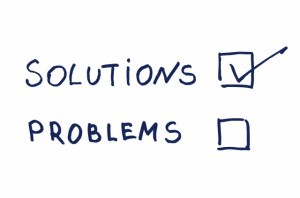 In many different ways I’ve written about being open to new ideas and change. In my book I shared a story about snowboarding through a gladed run. This particular story spoke of the importance of looking and moving to the spaces around the problems and not looking at the problems themselves. If you want to hit the trees, I concluded – look at the trees. If you want to ‘hit’ the fresh powder, well then …(For that full story click here, but I’ll also put a link at the end of this message.)
In many different ways I’ve written about being open to new ideas and change. In my book I shared a story about snowboarding through a gladed run. This particular story spoke of the importance of looking and moving to the spaces around the problems and not looking at the problems themselves. If you want to hit the trees, I concluded – look at the trees. If you want to ‘hit’ the fresh powder, well then …(For that full story click here, but I’ll also put a link at the end of this message.)
Previous to this post, I’ve also written about the value of being young and naïve vs. well seasoned and experienced. I have found that it’s not uncommon for experience to sometimes act as a burden when it comes to problem solving. When we think we know it all we start to become those who know less and less. At some point, because of our experiences, we inadvertently become closed off to challenge of new or changing ideas. That’s when we hear from others, or think to ourselves, “I’ve been doing it this way for X number of years – why would I / should I change?” Our well-honed routines provide us with the comfort that we know what we are doing but they put us at risk for becoming less curious about what we could be doing differently.
So, I come back to my opening remark; do you look for solutions to your problems, or do you find yourself finding problems in your solutions?
This isn’t the type of message where I offer an easy fix-all solution. There isn’t one. It is simply a question that I ask of myself, and I am suggesting that you ask it of yourself. I believe that simply this act of self-reflection will lead you to do a bit of both, which is, in my humble opinion the right way to go. In order to perform at any efficient level you must be looking for solutions to problems but you also must have a sense of what problems might arise.
Having an idea that a problem might present itself is much different than assuming that a problem will present itself. The former allows you to anticipate change and challenge; the later leaves you unwilling to change at all.
Before I sign-off – another self-reflective question; (and it’s one of my favourites!) In conversation do you listen, or do you wait to talk? !
Previous posts on being open to new ideas.
See the Spaces – an excerpt from The Power of More
Tweet
SEE THE SPACES
Posted in Marnie's Adventures
Tweet
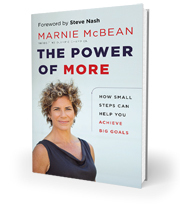 See the Spaces
See the Spaces
An excerpt from The Power of More, How Small Steps Help You Achieve Big Goals
… I was burnt out, exhausted both physically and emotionally. I needed a change, so at the age of twenty-eight I retired from sport. Or so I thought. The next year would help to remind me of some important and really doable goals that I had once set for myself.
In my retirement I unwrapped myself from my overprotective lifestyle and learned to snowboard in Whistler, B.C. I thought this would be a good time to go and play on a mountain instead of at a lake; I affectionately referred to this season as “the year of the broken bone.” Before retirement, my health had affected not only my performance but also that of my rowing partner. In this “arranged marriage,” Kathleen Heddle was my dependant, and I was hers. If I got sick or injured, I took Kathleen down with me; a port is no good without a star- board. This had made me particularly sensitive to the dangers of getting injured by doing something dumb. There would be little forgiveness if I showed up with a non-rowing injury. I had pretty much turned myself into a one-trick pony in bubble wrap. This was the first thing I wanted to change. I wanted to have fun, to be carefree, and I was prepared to accept the consequences. For the first time in a long while I felt as if I could take an unplanned risk. What joy!
Living in Whistler and learning to snowboard was fantastic, but I still craved structure and focus. At the suggestion of a friend, I took a course, got certified, and—with the help of Intrawest, the company that owned Whistler Blackcomb was quickly teaching adult beginner snowboarding. What a blast! I would free-ride in the morning with the other snowboard instructors, and then, from ten to noon each day, I’d teach a class. Saying that I snowboarded with the other instructors may be a bit of a stretch. The truth was that I had to do everything I could just to keep them in my sights. If this was a cup (of rice that) I was trying to fill, mine was still mostly empty.
Just as I hoped to progress and learn every day, I watched the other instructors improve their abilities too. They kept trying to get more height off a jump, to do a new trick, or to master a bigger feature. I watched how they would try every day but never put a timeline on their learning. They were definitely ambitious about snowboarding, but they were also patient. It made me realize that I had forgotten patience when I was rowing. I was also struck by how playful sport can be— there was so much joy.
The lifestyle I created as a snowboard instructor made a few other things apparent to me. Not the least was that I wasn’t cut out to be a great snowboarder! I missed rowing— the aesthetics of it, the challenge, and the way it mentally and physically tested me. I still craved taking something that I really “got” and discovering all that was left to learn. I wanted to learn way more about rowing again.
That season, the break I took from rowing, was a gift. It became clear to me that although winning was always a very important part of my goal-setting process, the cup I was really trying to fill was to master rowing. I knew I wasn’t there yet and I was still curious and hungry to know more. Winning was a result—not the goal. More importantly, I was given some further insight into my character: for me, joy and fun had been the original parts of the more that I reach for. I didn’t want to let go of that goal.
I lacked the speed and agility of my snowboarding friends, so even though I was having fun, keeping up with them on fresh-snow days was next to impossible. One day, as we approached a gladed run (a run with trees on it), one of them called back to me with a tip: “Don’t look at the trees.” After a few small collisions with the trees—not only embarrassing but also potentially dangerous—I realized the truth of that tip. When I looked at the trees, I hit the trees. When I looked around the trees, I would make it safely past.
What I learned was this: the spaces are more important than the trees. Actively look for the spaces; don’t get caught looking at the trees, because they are roadblocks and can bring our movement to a halt. Why do we so often get caught just staring at the problems around us when it is in the spaces that we find our solutions? I came to understand that this applies to more than just snowboarding; it applies to everything we do. On a gladed run, a skier or snowboarder should expect trees to be randomly present, just as we should expect challenges to occur randomly in other ventures.
From these snowboarders I took some great tools that I will use for the rest of my life. I would never have expected a group so stereotyped as anti-establishment rather than performance driven to help me in this way. Stepping away from rowing and letting myself learn from people so removed from my norm opened me to all of the different potential resources around me. Learning can come from everywhere; it is in the spaces too.
Tweet
March 1, 2016
Finding Calm in the Midst of Chaos. Parenting vs Doing Nothing….a comment on my productivity
Posted in What I'm thinking (Thoughts and opinions)
Tweet

Confucius says “Doing Nothing” above the throne room in the Hall of Union and Peace
As an Olympic Champion who’s been to 9 Olympic Games in various roles, I’ve been physically exhausted, emotionally exhausted and mentally exhausted. Until I became a parent – I’d never been all three at the same time.
For the first 5 months of our daughter Isabel’s life, other than parenting, I felt that I was getting nothing done. It wasn’t that I didn’t want to do (or to create) something more… it’s that I wasn’t physically, emotionally or mentally capable of doing much of anything. My brain’s logical and creative side shut down, giving way – I assume – to let myself develop some survival techniques – aka-parenting skills. I’ve loved it, but at the same time it has been frustrating to feel so…limited. This wasn’t what I’d hoped for.
While I was pregnant I thought I’d have lots of time to write and read during my maternity leave. I was looking forward to the time that I would have to think stuff through – I get a lot done when I’m at peace and doing nothing. I was going to branch out and put all of my creative thoughts to page. After all – there would be huge chunks of time when I’d be doing nothing but watching a baby. (A naïve mistake I realize but this is what I thought.) Ha! While I did have time, small, randomly spaced blocks of time, I had no idea that I would have no thoughts! (None that I could remember 5 minutes later anyways!) Exhaustion has a way of throwing your mind into utter chaos.
I always find my most, creative thoughts in the steady beat of repetition; this is my idea of peace. Long steady-state rows, runs, bike rides and even walks provide my brain with the white noise that it needs to clear through the chaos of everything and find inspiration. In 2007 in Beijing, I learned the wisdom that accompanies making time for doing nothing. That year I went to China 5 times helping Canadian athletes and teams familiarize themselves with Beijing and the sports venues that would host the 2008 Olympic Games. I became quite the tour guide of the Great Wall, the Silk Market and the Forbidden City. The later, the Chinese imperial palace, was where the Emperor (and Empress) lived and presided over court. It is also where first became aware of the Confucius phrase Doing Nothing.
In the Forbidden City there are 9 palaces each with a throne room and above each throne a Confucius phrase is written in beautiful calligraphy. Above the throne in the Hall of Union and Peace the phrase translates to Doing Nothing. When I heard this – I giggled; wondering what Emperor wouldn’t want to hang out there?
I was quickly taught what Confucius had meant by this and why this particular phrase had been hung there. This palace was an important one and as such, important decisions were to be made from that throne. The idea of Doing Nothing was instructing the Emperor to settle his mind and to clear through the chaos of all his other responsibilities so as to create clarity. In the wake of Doing Nothing an Emperor should find the inspiration for creative and wise thought.
Peace is not the absence of chaos, or noise…peace is found within the noise and the chaos
a fridge magnet of Sandra ‘Sam’ Morris
It was a super cool concept; there was so much wisdom to removing the limits of a cluttered mind. The modern idea might be if you stop multi-tasking so much you might have a better chance of thinking outside the box.
While pregnant, walking our dog Bernice had been my favourite doing nothing time. For a few months anyway, I could still calm my mind enough to develop ideas that I wanted to put some flesh on and write about. As a new parent pushing the stroller, grateful that Izzy would nap and give Bernice and me a calm and quiet hour it became more like a zombie walk. While I may have achieved some calm/quiet on the walk, I wasn’t even close to clarity, creativity or wisdom. I could find no path through the chaos of my exhausted brain as it was constantly working on how-to-parent questions.
And not only were there no ideas streaming out, I was struggling for any to come in. For the past 6 months a big joke (and a big waste of our money) has been the daily newspapers and magazines that come to our door. Pre-baby – after walking the dog and working out, the papers were read by 10am while savouring my coffee. That whole routine was the first to go: my comprehension was also out of focus.
Thankfully now, the initiation phase of being a new parent is coming to a close; we are catching our breath and finding our stride. So; if I want some creative thought back, I need to accept that parenting is lovely and will always be hard and challenging. It’s time to stop waiting for the chaos of our busy lives and the accompanying fatigue to completely go away.
What’s my point?
In some ways parenting (depending on how you parent) is way harder than going to and winning at the Olympics, but this isn’t just a parenting/exhaustion issue.
Chaos, fatigue and disturbed peace, with no opportunity to Do Nothing,ing are constants in our multi-tasking lives. To find opportunities for creative and wise thought we have to stop waiting for the chaos to go away – because it won’t. We have to stop waiting for our fatigue to go away because, chances are, even if you get some rest – it will come back. Once we embrace and anticipate the world as it is; full of change, long days and new challenges our mind can stop struggling against the chaos and can be inspired within it. I think this is when and how a modern Confucius would suggest that we could Do Nothing.
Now Isabel is almost 7 months. She is entertained by and interested in her toys and herself; learning to crawl requires a dedicated effort! Bashing a rattle on the floor is fascinating stuff! She naps and sleeps better and thus so do we but we’re still tired. We’re still learning; every milestone presents its own new chaos. As I come to grips with this new normal– the tripartite exhaustion seems to be lifting and my brain seems to be coming back on line.
I haven’t written and/or posted anything about being a parent yet. I suppose I should have written a few pieces about how amazing it is being a parent before this one…even a simple introduction to Isabel Maxwell Shelly-McBean might have been nice. But where she had inspired me to want to write… I was limited by my exhausted brain and couldn’t. Now I’m finding that I have things I want to say, and I want to discover some creative ways to say them.
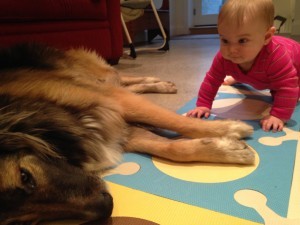
Izzy seems on the verge of decimating Bernice’s peace too.
Who knows…maybe this moment where I can Do Nothing and find my thoughts again will be short lived. I’m told once Izzy is crawling my ability to be still and think gets decimated all over again!
Apparently Confucius didn’t spend much time parenting.
Next up… Finding solutions to problems, not problems to solutions.
Tweet
June 4, 2015
Expectation Can Be the Enemy of Play
Posted in What I'm thinking (Thoughts and opinions)
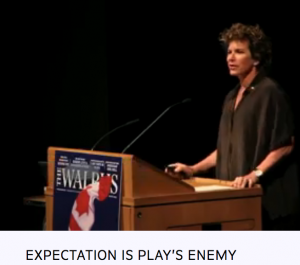
I learned more about the importance of Play from a bronze medal than any of the races in which I won.
When I was asked to do a Tedx talk, I knew that getting a point across in 20minutes – being both informative and entertaining – would be tough. When the Walrus Magazine asked be to be part of their speaker series, WalrusTalks, where the speakers are only given 7minutes!, I was pretty sure that the task would be impossible. But… what kind of motivator would I be, if I turned down opportunities and challenges because they seemed to be a bit challenging! I had to heed my own words, break it down into bits – and… try.
The theme that the speakers were given was simply “Play”. I could do anything I wanted to from there.
I knew I could have addressed the value of play in the way that structured-play is used by Right to Play around the world to build communities. They use play to educate and empower children and youth to overcome the effects of poverty, conflict and disease in disadvantaged communities. Through Play one can teach important lessons such as disease prevention (HIV, Malaria, and other waterborne illnesses) and inclusion of those are living with those illnesses.
I could also have discussed the importance of more unstructured-play for kids (and adults!) in our own communities. Our overly scheduled and observed lives leave less and less room for our imaginations and/or creative problem solving.
But I decided to address the play that should exist in, but to often is missing from, our work.
We all work. Whether that be in the form of a job from which we earn a paycheque, or work as school, sport, raising a family… I don’t believe that work should always feel like a burden or a grind, there should be (must be?!) some part of it that is enjoyable – and even fun. The people, what you get from it (intrinsic), what you get for it (altruistic), the mere act of doing or completing a task.. on any given day it might be different, but when we can recognize some element of what we are doing as enjoyable and even playful – the quality of not only our work – but of our lives goes up exponentially.
For my Walrus talk on play, I spoke about about my Olympic bronze medal, the one of four Olympic medals that I have that is not gold. I shared my observations that what was missing from that race was joy.
Play can exist in the hardest most challenging things that we are doing. It doesn’t have to be all skipping and smiles, it can be as competitive and focused as you choose. Try not to feel burdened by the expectations that come with work, but rather lifted and inspired by those expectations. Learn to frame joy and play as YOU like it.
It’s only 7 minutes… well – okay – I failed there… It’s about 11minutes, but it’s fairly short and to the point.
Expectation is (Can be!) the Enemy of Play

April 10, 2015
As Your Career Matures, Anticipate That The Fun Will Too.
Posted in What I'm thinking (Thoughts and opinions)
Winning my third gold medal wasn’t the same thrill as winning the first but that doesn’t mean that it wasn’t still fun to do. I had to learn/accept that it was just different. As a career matures, so must ones understanding of where the ‘fun’ comes from. If you think your career is void of joy chances are you’ll start feeling as if you’re grinding away, stuck in a rut and missing out on something. If you know how to find the joy in your career, even as that joy manifests itself differently over time, chances are you’ll remain curious, engaged and moving forward – and forward is fun!Recently, when I was putting together a 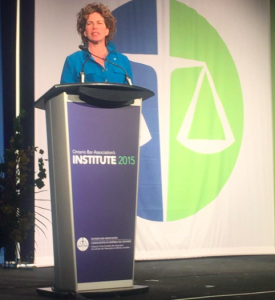 presentation for the Ontario Bar Association (OBA) I wasn’t convinced that talking about Starting Happy so that you can Finish Happy would entice a bunch of lawyers to come to the luncheon where I was to speak. This topic isn’t about trying to be all skip-happy with a giddy smile but upon introduction it might sound that way. It is a discussion about confidence in your preparation, dealing with hard conversations, anticipating change and challenge and knowing that you are the ‘someone’ that you’ve been waiting for. These four pillars create a “Start happy” foundation that is likely to lead to accomplishing your goals thus “Finishing Happy”. Still, I felt that idea of a discussion of being happy wouldn’t draw the lawyers in.
presentation for the Ontario Bar Association (OBA) I wasn’t convinced that talking about Starting Happy so that you can Finish Happy would entice a bunch of lawyers to come to the luncheon where I was to speak. This topic isn’t about trying to be all skip-happy with a giddy smile but upon introduction it might sound that way. It is a discussion about confidence in your preparation, dealing with hard conversations, anticipating change and challenge and knowing that you are the ‘someone’ that you’ve been waiting for. These four pillars create a “Start happy” foundation that is likely to lead to accomplishing your goals thus “Finishing Happy”. Still, I felt that idea of a discussion of being happy wouldn’t draw the lawyers in.
I then considered going with my core message, which is about a relentless pursuit of more. I was pretty sure that if I came at the lawyers with a presentation on doing more I’d lose the room too. This is a group of people who pride themselves on an extended and grueling education followed by a career of long days often clocking 60hr workweeks. If I pushed ‘more’ on this group – they might start throwing their buns at me!
The Start Happy/Finish Happy presentation had come from a conversation that I’d had in Sochi, which turned out to have a great impact on more than one person. I often use moments like that, concepts or ideas that come from interactions with ambitious driven people, as the foundation for the various speaking presentations that I give. The concept of more was no different. It came from my own experiences and was reinforced over the years by observations and conversations with many athletes that I’ve worked with. The idea is that when you’ve ambition to achieve a goal, when you get to that point where you think you’ve done everything, there is always a bit more that you can do; do more, be more, try more, learn more. But happiness and more just didn’t seem to be right to use as the framework for my OBA presentation.
Both concepts ‘Start Happy’ and ‘More’ apply to lawyers as much as anyone but I wanted to come at them from a different angle. So my brain stepped back from lessons that I had taken from isolated moments and considered my whole career of observed (and experienced) moments. It was one of the first times that I’d looked at it that way and I was struck by a sort of a-ha moment.
Considering personal lessons that had occurred as my own career progressed (as an athlete, as a mentor and even as a speaker) as well as the many interactions that I’ve had mentoring 5 Canadian Olympic Teams (COT) it was as if the lights got turned on. As I considered the progression of conversations that I’ve had with all the ambitious, high performance people that I have followed there is a consistent pattern in the development of their very successful careers and this pattern breaks down into two phases.
The first phase has a need for reinforcement in self-belief. Typical conversation: “You are exactly the kind of person that success happens to.” The second phase is a harder to encapsulate because these interactions are more complex. In this phase, performers must manage the shift from the excitement of chasing to the stress of being chased. They must figure out how to stick to the skills that got them to the top but at the same time the need to reinventing oneself to raise the bar again and stay there. Typical conversation: “Just because expectations are high and it feels different (more like work) doesn’t mean you’re on the wrong path.”
In the early stage, or rookie phase of our career, success is fun to chase; learning is exciting and accumulating titles and wins for the first time is a rush! The joy and fun at stage of your career is easy to feel, but this is also when we are most likely have doubts like “who am I to be doing something so great?” (Note – Just because someone is an early stage of their career is not to say they are a beginner or unskilled; an associate lawyer is not yet a partner, and a resident MD is not yet an attending but they are highly qualified. Some of the Olympic rookies that I have worked with have been World Cup champs, X-Games champs and even multiple World champions. They have a tremendous amount of experience and success in their field just none on the Olympic stage yet.) Making the mental crossover from dreaming of success to expecting it for the first time can cause some mental turmoil. In the Olympic environment, we are brought up watching people who seem like ‘superheroes’ winning gold medals. It can be quite the leap when you have to convert the mentality of a goal that seems audacious into a doable one for someone like you.
That’s why the first phase of conversations and observations is steeped in affirmations like; it is ‘normal’ people – just like you – doing special things, or you are okay if you’re stressed or even scared. Fear and doubt are normal parts of every ambitious path; do not let their presence deter you from your goals.
Typically conversations that group in the second phase are with performers who can be described as veterans. They have experience and/or success. As often as not, chats with this group are simply a search for joy, or more accurately –where has the fun gone? If their first huge success, an Olympic win, was preceded with joy and excitement was it possible to win again if that joy was diminished?
I think it was becoming aware of the consistency of the conversations for this veteran group that caused my a-ha moment. You see, very often this group gets somewhat ignored on the mentoring scale. They’ve had success, they know the ropes – the assumption is that they are fine. But that is a mistake that is too often made since we all know everything changes – including the ropes! This group of performers is searching for something; it’s just that in this phase of their career it’s different than before.
Through the years that I had mentored different Olympic teams I came to realize that if our goal was to increase the number of medals that Canada was winning at the Olympics then our biggest return was to help our returning medalist become repeat medalists. In no way did this mean we neglected the rookies, but as we got smarter about who we worked with the team started to do WAY better. We had stopped neglecting the vets.
As careers progress I’ve noticed that the stories, recollections and lessons become increasingly complex. As our career and goals mature there is an expected increase in responsibility, multi-tasking, and expectations. From many of the conversations that I’ve had, and considering my own career through 4 different Olympic quadrennials, it appears that as the sense of expectation, self-expectation and expectation from others goes up the sense of joy and fun seem to go down. To often the rush from repeating wins and titles diminishes as we mature, and the excitement from learning and even the drive to be curious all but disappears. What was fun became work, aka – the grind.
Performers in the second phase didn’t need affirmations that they could achieve success; they needed a bit of help to reframe where the fun came from as their career advanced. Oddly enough, it was their experience and success that often contributed to the missing joy in what they were doing.
As our career matures experience suggests to us that we know what we’re doing so we stop being so curious. After all, as a young performer we learned that curiosity can lead to dead-ends, mistakes and wasted time; why not just stick with what you know works? And – we gained enough confidence as we climbed the performance ladder that we feel comfortable starting hard conversations but – we become less inclined to listen to hard conversations and take critical feedback: this might imply that we’re not an expert in our field. As for stress or doubts– not that you have any anymore (at least never admit that you do!) You can manage this easily – on your own; no need to share what your thinking or feeling with others because that might imply that you’re struggling, or even worse – that your previous success was might have been a fluke.
If you’re honest with your self, you’ll admit that it was from those very things, curiosity, accepting critical feedback (actually being hungry for it!) and accepting/embracing stress that you used to find all the fun. “Back in the day…” the fun may have seemed that it was in the big things— the big objective wins—but now that you’ve matured, you know that the rush comes when you let yourself be challenged (and scared) by these little things. When you remember that, you put the fun and happy back into your day and a desire for more is clearly on your horizon.
A career doesn’t have to (shouldn’t!) feel like a grind; the best ones don’t. The presentation that I gave to the OBA ended up being a little bit about both happiness and more, but was framed around how those two concepts mature as you do.
Being Happy is absolutely essential to achieving more – but what happy looks and feels like will almost certainly change as we progress through our career. Work doesn’t have to feel like… work. There is no denying the fatigue and frustrations that will be part of a busy and challenging life but it should also be fun.
At the OBA conference, for first time since I’ve been talking about my experiences as a mentor I didn’t speak about a mentor moment – I spoke about a career of mentoring – and mentoring careers. I spoke to this group about mindset at different stages of ones career, and I loved it, and so did a hall full of lawyers.
“Marnie was a huge hit at the OBA institute meeting. When Marnie spoke you could have heard a pin drop. You really feel she speaks from the heart and has such great presence on stage. She was riveting.”

March 23, 2015
Thank you Steve Nash.
Posted in What I'm thinking (Thoughts and opinions)
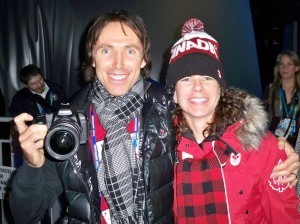
I was pretty happy to say hi to Steve behind the scenes at the Vancouver 2010 Opening Ceremony. Later he would be one of final 4 who would light the Olympic Cauldron
In 2012, Steve Nash wrote the the foreword to my book, The Power of More. I remain so grateful to this amazing Canadian. This week we learned that he has retired as a player from the NBA. In an article about Steve’s incredible legacy, The Globe and Mail columnist, Cathal Kelly wrote, “At 41, Mr. Nash had fully inhabited his imaginative space in NBA history. He was the skinny kid from Nowheresville (i.e. anywhere in Canada) who’d willed himself to the very top. He was a guy who’d outsmarted the game.” (full article)
Steve’s ability to “will” himself to the very top was because he, as he wrote in my book, believed in “taking the time to lay out your path in measurable steps, a practical approach can instill a beautiful confidence that comes from knowing you can actually achieve what you’re setting out to do.” Steve’s incredible work ethic is legendary – he always broke things down to their base details, drilled on those details until he mastered them and then used them to his greatest advantage. As Mr.Kelly also wrote “What Mr.Nash did in his prime…was marry the cerebral with the kinetic. His primary gift as a player was that he thought at speed. That’s what the best players do in any sport. They slow then bend time.”
Anytime you set a goal for yourself, you create the possibility of success; with Marnie’s book, you also create a plan to see it through.
When I was writing my book, The Power of More, I can’t tell you how thrilled and honoured I was when Steve agreed to write the foreword. Of all the global champions that I know from professional and olympic sport, and all the philanthropists, business people and politicians who have made their incredible successes seem easy – Steve was my first and best choice to ask. Knowing his attention to detail and dedication, I was sure that he would also embrace my concepts of breaking things down into manageable steps – and he did, and still does.
Steve’s foreword wraps up with him saying, “It teaches you that you can be excited about what comes next, and that you get to dictate so many of the terms for yourself. So read it, and then, as Thoreau said, “Go confidently in the direction of your dreams.”” Well Steve, I hope the same for you now. I hope that you will be excited about what comes next. Like the mythical phoenix (Phoenix Sun ?), from the ashes of the “1st death of an athlete” will rise something spectacular. Once you figure out the terms that you want to dictate to yourself – go confidently – I’ve no doubts your next career will be something pretty awesome.
Good luck and – thank you Steve.
Sincerely,
Marnie
Here is the foreword that Steve wrote for The Power of More – How Small Steps Can Help You Achieve Big Goals.
I’ve known Marnie since I was a teen, when she was training at the Victoria City Rowing Club in my hometown, and I’ve run into her at two Olympics since. Marnie isn’t a multiple gold medallist by chance. As this book describes, she’s created a methodology for success that matters. It matters because it sets out the steps needed to get to chosen results. And in Marnie’s case, those results are pretty impressive.
Marnie’s someone who really exudes confidence. But she’s not ego-driven. She just knows the time and effort she has put into determining and reaching her goals, and therefore the likelihood that she’ll be met with success. As a fellow goal setter (and a too-short-for-my-chosen-profession professional) I get it. A lot of people have heard the whole “underdog” story about my “improbable rise to the NBA.” There’s a book about me called “Long Shot.” (I think there’s a compliment in there somewhere.) But if you talk to the people closest to me, they didn’t have that same “that’s impossible” attitude toward my ambitions, and they didn’t think I was a nutter or an ego maniac for having them. And I think of a lot of my experience is explained by what Marnie writes about here: I had a realistic picture of what would be required to make it to where I wanted to be, and I went about it practically enough that it seemed less outlandish (not not outlandish, but less so) to those who knew me best. (It’s also entirely possible that they just didn’t know any better, and were just agreeing with me to be kind.)
That’s a big part of any success: deciding on your aims, making a plan, mapping that plan from start to finish, and, along the way, conceptualizing the realities of what’s entailed – whether it’s time, resources, personal support, or other factors – in starting out. People often equate being practical with being conservative or unambitious; it doesn’t have to be. Because you’re taking the time to lay out your path in measurable steps, a practical approach can instill a beautiful confidence that comes from knowing you can actually achieve what you’re setting out to do. Sure, fate is always going to jump in and throw you a freak snowstorm or some other mischief, but being attentive to and thoughtful with your planning is paramount to getting where you want to be.
Marnie and I are both athletes, but our life goals aren’t limited to sports, and this book isn’t about physical feats. “Where you want to be” can mean anything. The tools Marnie sets out here can be adapted to any environment, dream, or hope, which makes this such a useful guidebook. Your own goal can be as spontaneous or inventive as you are, or as simple as “I’m going to keep this pace until I get to that tree” or “I’m going to work on this creative until I have five ideas that I really love.” Sure, it can be a game within ourselves, but it’s more than a mind trick. It’s success at play. And the funny thing about goals is that you’re really the only person who knows whether you can achieve them: you know your strengths, your weaknesses, and how committed you are to the work of making your goals happen. Anytime you set a goal for yourself, you create the possibility of success; with Marnie’s book, you also create a plan to see it through.
What I especially like about Marnie’s approach is her direction for the tough spots. Success does not always come easy. As an athlete, I’ve played at various times in my life with less-than-ideal conditions: flu, a broken nose, a swollen-shut eye, a cut-open face, a sleepless night spent with a toddler (albeit absolutely adorable) who woke up at four am and just felt like chatting with her old man for the next three hours, and a degenerative back condition that rarely seems to care about my plans for success. Yet what I need to do performance-wise on a given day doesn’t change. Marnie looks at those “bad days” with the same practical approach that shows how to make them work, how to play through with the same positive outlook that comes easily on the good days.
The Power of More, as the title suggests, also has something for those among you who have already accomplished many goals. Marnie’s strategies for digging deep to find the next objective and create a plan for it will keep you inspired and driven for years to come. Maybe for Marnie it’s making the Olympics in another sport (just kidding –but don’t put it past her); maybe for you it’s learning a new language or communicating more effectively with your significant other. This book really has something for everyone who is interested in how to get more out of themselves, and more out of life. It teaches you that you can be excited about what comes next, and that you get to dictate so many of the terms for yourself. So read it, and then, as Thoreau said, “Go confidently in the direction of your dreams.” If knowledge is power, this book really is the Power of More.
Steve Nash
as printed in The Power of More – How Small Steps Help You Achieve Big Goals

February 3, 2015
What Super Heroes Don’t Tell You
Posted in Marnie in the NewsMentor Messages
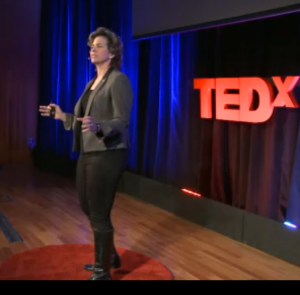 Believing that we can achieve success and big, seemingly infinite, goals can seem impossible for us “normal*” people. For the likes of Super Hero Buzz Lightyear, who will readily leap “To INFINITY and Beyond!!!” it’s a breeze. How do they do that?!
Believing that we can achieve success and big, seemingly infinite, goals can seem impossible for us “normal*” people. For the likes of Super Hero Buzz Lightyear, who will readily leap “To INFINITY and Beyond!!!” it’s a breeze. How do they do that?!
This weekend I spoke at a TedX event at the University of Toronto’s Scarborough campus. I titled my presentation “What Super Heroes Don’t Tell You” and had a lot of fun delivering my message.
I used a few big-event examples from my rowing career that tended to push my ego to believing that I was special. It’s easy to think that crossing an Olympic finish line in 1st place can make a person believe in their own Super Hero status! But almost invariably for me, something happened immediately after each of my big achievements that served to remind me to put my feet back on the ground. I was just a normal person who was doing some pretty special things; not a special person, and certainly not a super hero.
Eventually I figured it out. The secret that Super Heroes aren’t so quick to share with us normal people is that they are normal people too; there are no Super Heroes. Infinity, by definition, is the largest number possible – but also it is the collection of all real numbers. To say it a little differently – you can never say “infinite +1” because it already includes all the possible “+1”s. So… I believe the way to reach “infinity and beyond” isn’t about leaping to infinity in a single enormous bound, rather it’s done by advancing one very normal, very doable, “+1” at a time.
This is how the Philosophy of More works. We can all – be, or learn, or do, or try – a little bit more. Focus on the little steps and the big steps/goals/successes will take care of themselves.
That’s how normal people like us (you and me) get big super hero-like stuff done and attain those big, and seemingly infinite goals.
I’ll attach the TedX video here when it’s posted.
*Normal – I recognize that referring to anything as “normal” is almost always inaccurate. We now believe in such a broad range of diverse cultures and behaviours that to define anything as normal would be next to impossible to capture. I’ll start with there is no abnormal – and to your own self be true – for the purposes of this comparison to super heroes – that’s “normal” enough!

January 13, 2015
The Dangerous Side of a Blind Pursuit of More ~ and What Ernie and Bert have to say about it
Posted in Mentor Messages
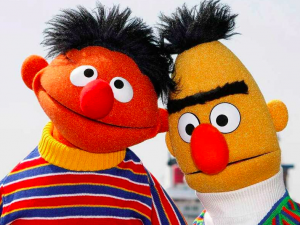 I often cite a particular Ernie and Bert skit as one of my favourite examples of Art Imitating Life. I’ve wanted to write about it for a while – but I’ve found it tough figuring out how to approach it. If I’m not careful it will look like I’m suggesting that people can be ungrateful for what they receive – but that’s not what I see as the nugget in the discussion between these two Sesame Street icons. It’s more about the importance of knowing what it is that you want so as to avoid a sense of entitlement that you deserve everything that is available.
I often cite a particular Ernie and Bert skit as one of my favourite examples of Art Imitating Life. I’ve wanted to write about it for a while – but I’ve found it tough figuring out how to approach it. If I’m not careful it will look like I’m suggesting that people can be ungrateful for what they receive – but that’s not what I see as the nugget in the discussion between these two Sesame Street icons. It’s more about the importance of knowing what it is that you want so as to avoid a sense of entitlement that you deserve everything that is available.
In the skit, Ernie has two pieces of pie. He’s going to give one to Bert, but first, he takes one for himself. The two pieces aren’t the same size, one is much bigger than the other and Ernie takes the bigger one. Bert is surprised by this and suggests that Ernie has made a selfish decision. The reason he provides for why he thinks so gets right to the heart of dangerous side of a blind pursuit of more.
I believe in more. I talk and write about it a lot. I firmly believe that in the presence of an ambition to achieve something there is always more that I can try, learn and do. The pursuit of more can be limitless. But it gets tricky if you try to apply this philosophy of more to things that you want to get (versus want to do,) and trickier still if you don’t know exactly what you want or why you want it.
Knowing what you want is the best way to be happy when you get it. Knowing why you want it provides you with some perspective when you achieve it and—as importantly—in case you don’t. It is the why you want something that helps you reassess, realign and if you choose – try again. I’ve seen people get frustrated by their sport, business or even social careers because they know that they want something but they don’t exactly know what or why. This is where entitlement seeps in; a sense of deserving something simply ‘because’. It’s sad to see and not fun for anyone.
In the skit, after Ernie takes the big piece and leaves the smaller piece for Bert, Bert suggests that Ernie has taken the wrong one. “Why is that Bert?” Ernie asks, “Which piece would you have taken?” Bert replies that if he had two pieces, a big piece and a little piece, that he would take the little piece for himself and give away the big piece. “But Bert,” Ernie points out, “You GOT the little piece. You GOT the one you wanted.”
I love it. The logic is perfect. Bert got exactly what he wanted. If you find yourself blindly wanting more simply for the sake of more – you will probably also realize that you are unclear on what your goals truly are or why the path /pursuit that you’re on is important to you.
Yes – I know there is some commentary here on being hospitable and that good manners might suggest always providing the more desirable objects to others, but in the end… if you get given what you would have given yourself and you can recognize it, then that’s the key to staying positive and happy as you pursue your ambitions. The pursuit of more is not always fair, but it’s real and it should be fun, and it’s even better when it’s funny.




